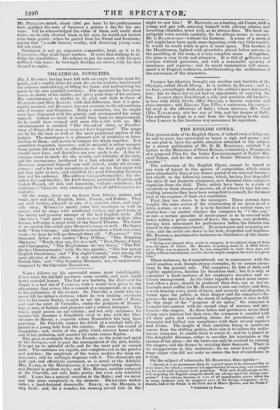THE ENGLISH OPERA.
THE present state of the English Opera, if indeed such a thing can be said to exist, has occasioned us many a sigh and groan ; and we are glad to have the public attention attracted to the subject by a recent publication of Mr. G. H. RODWELL, entitled " A Letter to the Musicians of Great Britain, containing a Prospectus of a proposed Plan for the better Encouragement of Native Mu- sical Talent, and for the erection of a Grand National Opera in London." *
The extinction of the English Opera, cannot be traced to any want of talent in this species of composition, which exists more abundantly than at any former period of our musical history ; but chiefly to the following causes, which, having first degraded the style of our dramatic composers, now threaten their complete expulsion from the field. These artists have been in a state of servitude to three classes of masters, all of whose (it may be) con- tending interests they have been compelled to consult, for the most part at the expense of their own reputation.
First, they are slaves to the managers. These persons have usually the same notion of the construction of an opera as of a table, a chair, or a coat. It is to be finished in a certain time, no matter how—no matter whether the composer be " i' the vein" or not—a certain quantity of music-paper is to be covered with notes, within a given number of days ; the opera, very probably, having been announced for performance before the libretto was placed in the composer's hands. Remonstrance and reasoning are vain ; and the artist sits down to his:task, dispirited and hopeless. Mr. RODWELL mentions t wo instances as illustrative of this mana- gerial tyranny.
" Bishop was allowed three weeks to compose, in its original shape of three acts, the opera of Vlari. Mr. Barnett, in putting music original A Bold Stroke fn. a Wife, was so pressed, that he was compelled to work three days and nights without intermission, in order that he might complete the work in a given time."
These instances, be it remembered, are in consonance with the usual practice, and, though strong examples, by no means excep- tions to the general rule. The composer, by dint of daily and nightly application, finishes his thankless task ; but it is only to encounter a fresh instance of his employer's senseless and ar- bitrary management. As the latter regards it much more impor- tant when a piece should be produced than how, one or two re- hearsals must suffice (in Mr. BARNErr's case one only); and thus, a work bearing every mark of haste, and scarcely one of genius, is thrust upon the public, to their disgust and the composer's dis- grace,—for upon his head the storm of indignation is sure to fall. In this stage of the " progress of an opera," the composer is brought into contact with his second class of masters and mis- tresses—the singers. As these ladies and gentlemen never think of any one's interest but their own, the composer is assailed with all their petty and contending claims for precedence; and is besought and bullied into compliance with their several caprices and whims. The height of their ambition being to receive an encore from the shilling gallery, their aim is to induce the unfor- tunate composer to enable them to attain it: and he is placed in this delightful dilemma, either to sacrifice his reputation or the success of his piece,—for the latter can only be assured by coaxing the singers, and the former by resisting their demands. There is no exaggeration in this statement; for we never knew a single stage singer who did not make an encore the test of excellence in a song.
On the subject of rehearsals, Mr.RODWELL thus speaks-
" Abroad, it is no uncommon thing for a grand opera to be rehearsed fifty or sixty times; by which a composer has opportunities of correcting and recorrect- ing his work until it almost reach perfection. With such disadvantages as bis, is it surprising the English composer should not always equal his foreign com- petitor? I say always, because, in spite of all impediments, native talent has in many instances very far surpassed most of the foreign composers : as in- stances, look at the Finale to the First Act of Henri Quatre, and the Finale t
• Published by Fraser.














 Previous page
Previous page